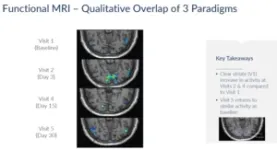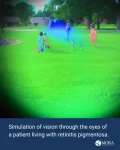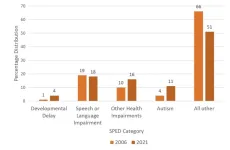(Press-News.org) An international research team led by investigators at Virginia Commonwealth University has identified for the first time markers that may indicate early in life if a person has susceptibility to schizophrenia.
The ability to predict the risk of developing schizophrenia later in life may allow early detection and intervention, which the researchers hope can reduce the impact of the disease on individuals, families and communities. Their results have been published in Molecular Psychiatry.
Schizophrenia is a serious psychiatric disorder that is most often detected in young adulthood. It affects as much as 1% of the world population and can cause debilitating effects such as a sense of losing touch with reality. People with the disorder are up to three times more likely to die early and often face discrimination, social isolation and debilitating physical illness, according to the World Health Organization.
Although schizophrenia involves an inherited genetic component there is strong evidence that environmental factors play a role in whether a person develops the disease. These environmental factors can trigger chemical changes to DNA that regulate what genes are turned on or off through a process called methylation.
Studying possible genetic triggers for a disease like schizophrenia is complicated because methylation changes can be caused by the disease itself and related factors such as the stress and medications that usually accompany it.
Because of the effects of the disease on the methylome — the term for the set of nucleic acid methylation modifications in an organism's genome or in a particular cell — ideally samples would be obtained before the disease occurs. But since schizophrenia is a disorder of the brain, this would be impossible.
To resolve this problem the research team — led by VCU School of Pharmacy professors Edwin van den Oord, Ph.D, and Karolina Aberg, Ph.D. — devised a unique approach.
First, they examined blood samples that had been drawn shortly after birth from 333 infants in Sweden, tracking 24 million methylation marks. The team used statistical analysis that allowed them to study methylation marks on a cell-type-specific level.
“Since the sampled blood was collected within hours of birth, years before any schizophrenia symptoms occurred, these findings cannot be influenced by the disease itself or other postnatal factors,” noted Aberg, principal investigator for the study and associate director of the Center for Biomarker Research and Precision Medicine at VCU.
Next, the team validated any significant findings from the blood samples by comparing them to transcriptional data from 595 postmortem brain samples from different people — some with schizophrenia and others in a control group who did not have the disease. The brain samples were provided by investigators from around the world including Europe, North America and Australia.
The team also compared their findings against methylation data from adult blood drawn from schizophrenia cases and controls — a total of 2,970 people.
The researchers concluded that certain differences in methylation already present in newborns indicate an increased risk of developing schizophrenia.
“In other words, we could identify methylation differences between individuals that later on in life would develop schizophrenia and controls that are unique to specific cell-types in the neonatal blood,” said van den Oord, the first listed author of the paper in Molecular Psychiatry and director of the Center of Biomarker Research and Precision Medicine. “Research will continue around these methylation differences to develop potential future clinical biomarkers that will allow early detection and intervention.”
This work was supported by a $2.3 million grant from the National Institute of Mental Health. Labwork and analysis took place at VCU’s Center for Biomarker Research and Precision Medicine, which is affiliated with VCU School of Pharmacy.
END
DNA methylation markers for increased risk of schizophrenia identified for first time in newborns
The ability to predict the risk of developing schizophrenia later in life may allow early detection and intervention.
2023-04-27
ELSE PRESS RELEASES FROM THIS DATE:
Geneticists link phenotype of Balto, famed sled dog, to modern breeds
2023-04-27
ITHACA, N.Y. – A Cornell University-led project has added a new chapter to the story of Balto – the most famous sled dog in history – by using ancient DNA extraction and analysis to reconstruct his phenotype and identify his genetic connections to modern dog breeds.
The research reveals Balto’s lineage was genetically healthier and less inbred than modern breeds, with characteristics adapted to the extreme environment of 1920s Alaska.
The team’s paper, “Comparative Genomics of Balto, a Famous Historic Dog, Captures Lost Diversity of 1920s Sled Dogs,” published April 27 in Science.
Heather Huson, associate professor of animal science ...
Highly dexterous robot hand can operate in the dark -- just like us
2023-04-27
New York, NY—April 27, 2023—Think about what you do with your hands when you’re home at night pushing buttons on your TV’s remote control, or at a restaurant using all kinds of cutlery and glassware. These skills are all based on touch, while you’re watching a TV program or choosing something from the menu. Our hands and fingers are incredibly skilled mechanisms, and highly sensitive to boot.
Robotics researchers have long been trying to create “true” dexterity in robot ...
Texas Tech researchers contribute to groundbreaking mammal research
2023-04-27
Why was Balto, a famous sled dog from the 1920s, able to survive the unforgiving conditions of Alaska? It was one of many findings uncovered through the Zoonomia Project, which involved researchers from Texas Tech University.
More than a dozen researchers from the Department of Biological Sciences were among the major collaborators in the Zoonomia Project who will publish their multi-year comparative genomic analysis of mammals and the influence of genetic change on health and disease in the April 28 issue of Science magazine.
The laboratory of David Ray, professor and associate chair of the department, studies transposable elements ...
Snowballing effects of beech leaf disease hurt helpful root fungi
2023-04-27
The American beech, Fagus grandifolia, is a North American staple and the dominant species in many northeastern forests. In 2012, a new disease was first spotted, infecting trees in northeastern Ohio. The worst afflicted had dark banding on their leaves, which emerged crumpled and leathery in the spring. Not until 2018 would experts discover the nematode pest, Litylenchus crenatae mccannii, overwintering in the buds of infected trees.
As it marches across the continent, researchers are still ...
Higher rates of autism and attention deficit/hyperactivity disorder in American children
2023-04-27
In a recent publication released by PubMed, American scientists led by Dr. Dufault at the Food Ingredient and Health Research Institute, reported alarming increases in the numbers of children requiring special education services. While student enrollment in US schools remained stable from 2006-2021, the percentage of children receiving special education services increased 10.4%. Of the three disability categories under which children with autism may receive services, autism caseload percentages tripled jumping from 4% to 11% while developmental delay caseload ...
Improving geriatric surgical quality is feasible for a wide range of hospitals
2023-04-27
Key takeaways
Feasible for small and large hospitals: Pilot institutions in the study included community hospitals and academic medical centers representing every region of the United States.
Geriatric surgical patients are a growing population: American College of Surgeons standards for geriatric surgery address a growing population that most hospitals serve.
Standards help address barriers to implementation: ACS geriatric surgery standards help hospitals identify and address challenges to providing optimal care, including staffing, manpower, and lack of geriatricians in many hospitals.
CHICAGO: ...
Scripps Research preclinical study finds insomnia drug blocks oxycodone relapse
2023-04-27
LA JOLLA, CA—The insomnia drug suvorexant (Belsomra®) might be an effective treatment for opioid use disorder, according to a preclinical study from Scripps Research.
In the study, published April 27, 2023, in Frontiers in Pharmacology, the Scripps Research scientists found that suvorexant reduced prescription opioid intake and helped protect against relapse in rats modeling opioid use disorder (OUD). If the results translate to humans in clinical trials, the insomnia drug could offer a promising approach for the millions of people who have OUD.
“Our results suggest that repurposing suvorexant could be a good strategy for reducing drug intake and blocking relapse in cases ...
Calling all canines: Help sniff out the dangerous spotted lanternfly
2023-04-27
From New York to North Carolina and as far west as Illinois, the invasive spotted lanternfly is causing chaos in many states where agricultural and forestry industries are essential to the economy. It has been estimated that crops and forest production losses caused by insects and pathogens are close to $40 billion a year.
Spotted laternflies, native to mainland China, prey upon 70-plus host plant species, stealing their nutrients with their piercing snouts, called stylets. They are often characterized as “hitchhikers” for their ability to move ...
AGS honors expert & emerging geriatrics leaders at 2023 Annual Scientific Meeting (#AGS23)
2023-04-27
New York (April 27, 2023) – The American Geriatrics Society (AGS) annually honors researchers, clinicians, educators, and emerging health professionals who have made outstanding contributions to high-quality, person-centered care for older adults. This year’s award recipients include 19 leaders representing the breadth of medical disciplines championing care for us all as we age.
Clinical Student Research Award
Matthew Ryan Cosmai
Clinician of the Year Award
Shelley R. McDonald, DO, PhD
David H. Solomon Memorial Public Service Award
Alan Lazaroff, ...
Plastic particles themselves, not just chemical additives, can alter sex hormones
2023-04-27
Amid rising evidence that additives designed to improve plastics also disrupt sex hormones, a Rutgers laboratory trial shows that plastic itself can do likewise when inhaled at moderate levels.
Previous studies focused on chemicals such as bisphenol-A (BPA) that make plastics stiffer or more flexible. These findings spurred ongoing efforts to find safer plastic additives.
The Rutgers study showed that microscale and nanoscale particles (MNPs) of polyamide, a common plastic better known as nylon, produced endocrine-disrupting ...
LAST 30 PRESS RELEASES:
ASU researchers to lead AAAS panel on water insecurity in the United States
ASU professor Anne Stone to present at AAAS Conference in Phoenix on ancient origins of modern disease
Proposals for exploring viruses and skin as the next experimental quantum frontiers share US$30,000 science award
ASU researchers showcase scalable tech solutions for older adults living alone with cognitive decline at AAAS 2026
Scientists identify smooth regional trends in fruit fly survival strategies
Antipathy toward snakes? Your parents likely talked you into that at an early age
Sylvester Cancer Tip Sheet for Feb. 2026
Online exposure to medical misinformation concentrated among older adults
Telehealth improves access to genetic services for adult survivors of childhood cancers
Outdated mortality benchmarks risk missing early signs of famine and delay recognizing mass starvation
Newly discovered bacterium converts carbon dioxide into chemicals using electricity
Flipping and reversing mini-proteins could improve disease treatment
Scientists reveal major hidden source of atmospheric nitrogen pollution in fragile lake basin
Biochar emerges as a powerful tool for soil carbon neutrality and climate mitigation
Tiny cell messengers show big promise for safer protein and gene delivery
AMS releases statement regarding the decision to rescind EPA’s 2009 Endangerment Finding
Parents’ alcohol and drug use influences their children’s consumption, research shows
Modular assembly of chiral nitrogen-bridged rings achieved by palladium-catalyzed diastereoselective and enantioselective cascade cyclization reactions
Promoting civic engagement
AMS Science Preview: Hurricane slowdown, school snow days
Deforestation in the Amazon raises the surface temperature by 3 °C during the dry season
Model more accurately maps the impact of frost on corn crops
How did humans develop sharp vision? Lab-grown retinas show likely answer
Sour grapes? Taste, experience of sour foods depends on individual consumer
At AAAS, professor Krystal Tsosie argues the future of science must be Indigenous-led
From the lab to the living room: Decoding Parkinson’s patients movements in the real world
Research advances in porous materials, as highlighted in the 2025 Nobel Prize in Chemistry
Sally C. Morton, executive vice president of ASU Knowledge Enterprise, presents a bold and practical framework for moving research from discovery to real-world impact
Biochemical parameters in patients with diabetic nephropathy versus individuals with diabetes alone, non-diabetic nephropathy, and healthy controls
Muscular strength and mortality in women ages 63 to 99
[Press-News.org] DNA methylation markers for increased risk of schizophrenia identified for first time in newbornsThe ability to predict the risk of developing schizophrenia later in life may allow early detection and intervention.







